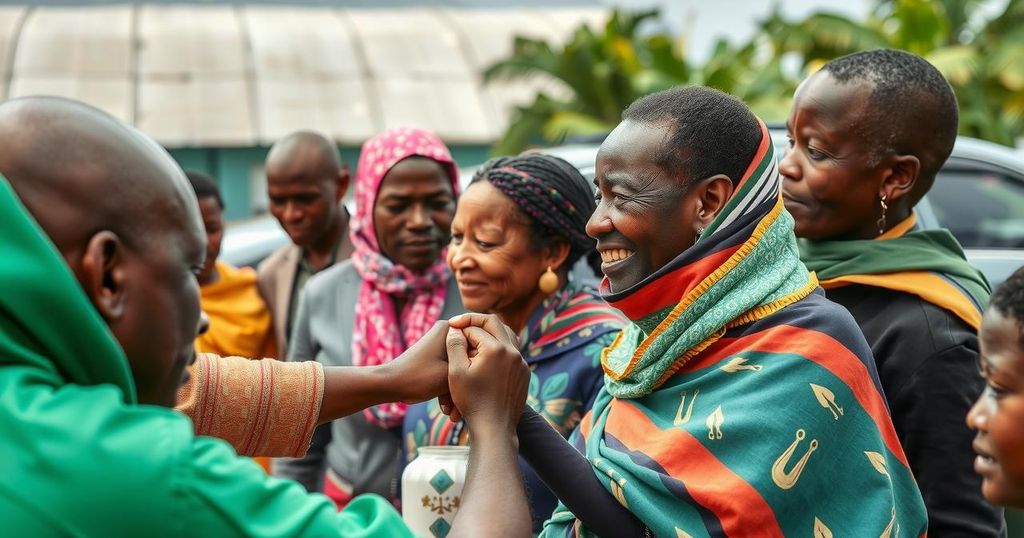Over ten years of conflict in Ituri, DRC has fueled violence between the Lendu and Hema communities. Despite this, local efforts for reconciliation and peace-building are emerging. Former combatants, such as Elle Alphonsine Cecile, are now advocates for peace. The Congolese government, supported by international organizations, implements comprehensive strategies combining military intervention, disarmament, and socio-economic programs while addressing significant governance issues. Grassroots organizations are pivotal in promoting unity and cooperation amid ongoing challenges.
The province of Ituri in the eastern Democratic Republic of Congo (DRC) has faced over a decade of inter-ethnic conflicts, predominantly between the Lendu farmers and Hema herders, fuelled by long-standing rivalries over land and resources. While the violence has reached alarming levels, it has also ignited numerous reconciliation initiatives that display local communities’ resilience and hope. The struggles in Ituri can be traced to historical enmities exacerbated by external influences exploiting the region’s rich mineral resources, particularly gold, amid ongoing instability in the Great Lakes area.
With state authority experiencing a decline, vulnerable youth have taken up arms, perpetuating the cycle of violence. Yet, despite this backdrop of trauma, individuals like Elle Alphonsine Cecile, a former combatant, are emerging as catalysts for change. Ms. Cecile reflects on her regret for having participated in violence, stating, “It was the absence of peace that drove us to take up arms. Today, I regret my actions.” Such sentiments are echoed by many in the community, who now seek peaceful coexistence through local dialogue initiatives and cooperative ventures.
Community-led dialogue forums have become an essential platform for former adversaries to share experiences and foster understanding. Young activists, including Cecile and her peer Ngabu Jospin, now contribute to peace-building efforts through projects aimed at improving local infrastructure, illustrating a commitment to collaboration. Jospin emphasizes, “Peaceful coexistence is better than unnecessary conflicts that plague the region.”
To address the complex situation, Congolese authorities and international organizations have adopted a multi-pronged approach that incorporates military action, disarmament efforts, and socio-economic reintegration programs for ex-combatants. The Congolese armed forces have engaged armed groups to minimize their impact. Local leaders report that military offensives have facilitated inter-community cooperation and dialogue in regions previously marked by tension.
Simultaneously, reintegration programs support ex-combatants by offering vocational training and encouraging community engagement through agricultural and developmental projects. Despite these positive strides, Ituri continues to grapple with humanitarian crises, such as food insecurity and violence against displaced populations. Compounding these issues are political players who exploit ethnic divisions to pursue economic interests.
Gracien Iracan de Saint-Nicolas, a national deputy from Ituri, identifies a critical barrier to achieving lasting peace: public distrust in state institutions that are seen as ineffective and corrupt. He asserts that credibility must be reestablished for genuine peace to take hold. Despite these obstacles, numerous grassroots organizations are emerging, advocating for constructive dialogue and challenging ethnic stereotypes.
Women’s groups play a vital role in the peace process, addressing their unique experiences and leading the charge for reconciliation. Initiatives organized by local associations, such as the Forum d’appui au développement de la femme, emphasize the power of community engagement to foster understanding and cooperation. The Iturian diaspora also contributes by funding developmental efforts and promoting peace internationally.
To realize Ituri as a bastion of peace, cohesive support through national and international collaboration is essential. Establishing transitional justice mechanisms will be crucial for reconciling past grievances and rebuilding trust. A legitimate state presence must be prioritized to secure safety and deliver essential services.
In conclusion, despite the numerous challenges that remain in Ituri, local examples of resilience, such as those shared by Ms. Cecile and Mr. Jospin, underscore a hopeful path forward. Enhanced dialogue and developmental initiatives can facilitate healing and mutual cooperation, signaling a potential transformation of Ituri into a regional model for peace and coexistence.
The article discusses the persistent inter-ethnic conflicts in the Ituri province of the Democratic Republic of Congo (DRC). It highlights the historical animosities between the Lendu and Hema communities, exacerbated by external factors such as mineral exploitation and the collapse of local governance. The conflict has led to a culture of violence, with many young individuals joining militia groups. However, within this turmoil, there are emerging local efforts aimed at reconciliation and peace-building, exemplified by community leaders dedicated to fostering dialogue and cooperation amidst ongoing challenges.
In summary, while the Ituri province continues to face severe challenges stemming from inter-ethnic violence and humanitarian crises, there are significant initiatives underway that offer hope for reconciliation and stability. The commitment from local individuals and organizations to foster dialogue and community development indicates a pathway toward restoring peace. By bolstering local governance and addressing historical grievances through transitional justice, Ituri could indeed evolve into a hallmark of resilience and peaceful coexistence in the DRC.
Original Source: peacenews.com






